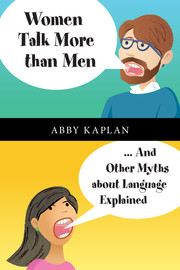Book contents
- Frontmatter
- Contents
- List of figures
- List of tables
- Acknowledgments
- 1 Introduction
- Part I … But is it language?
- Part II Language learning
- Part III Language in use
- 8 ‘Women talk more than men’
- 9 ‘Texting makes you illiterate’
- 10 ‘The most beautiful language is French’
- 11 ‘My language limits my thoughts’
- Appendix A Statistics brief reference
- Language index
- People index
- General index
9 - ‘Texting makes you illiterate’
from Part III - Language in use
Published online by Cambridge University Press: 05 April 2016
- Frontmatter
- Contents
- List of figures
- List of tables
- Acknowledgments
- 1 Introduction
- Part I … But is it language?
- Part II Language learning
- Part III Language in use
- 8 ‘Women talk more than men’
- 9 ‘Texting makes you illiterate’
- 10 ‘The most beautiful language is French’
- 11 ‘My language limits my thoughts’
- Appendix A Statistics brief reference
- Language index
- People index
- General index
Summary
As social beings, humans are deeply invested in communicating with each other. As a result, we shouldn't be surprised that many technological developments are related to communication, and more specifically to language. Some language-related technologies are so old that we hardly think of them as technology at all – writing itself, for example. At the other end of the spectrum, we're highly sensitive to the newest technologies, such as various forms of electronic media.
When we use some technology to transmit language, its form isn't neutral: it shapes how we say things, and therefore also potentially what we say. It matters, for example, that writing (but not speech) is permanent, that it can be revised and edited, and that it carries only limited information about tone of voice. Telephone and radio transmit audio but not video; the listener has access to the voice but not to nonverbal cues. Telegrams used to be priced by the word, which encouraged senders to use as few words as possible in what became the classic ‘telegraphic’ style.
When a technology becomes widespread enough, it's theoretically possible that it could influence people's language even when they're not actively using the technology. In other words, a society might adopt a particular technology and find that its use of language in general changes as a result. In this chapter, we will explore popular worries along these lines related to technologies old and new. In a modern context, we'll focus particularly on text messaging, for three reasons: at the time of this writing, texting is a source of considerable public angst; many of the linguistic phenomena associated with text messages are actually characteristic of digital communication more generally; and there exists a body of scholarly literature on the topic. We will conclude with a look at several studies that investigate whether there's a connection between text messaging behavior and literacy skills.
Reactions to new and old technologies
Any new technology will be met with a mix of enthusiasm and trepidation. Baron (2009) describes how writing itself, which today we take for granted, was greeted with suspicion in many quarters: Plato, for example, worried that the written word was incapable of the kind of back-and-forth that characterized face-to-face communication, and that those who relied on writing would not properly exercise their memories.
- Type
- Chapter
- Information
- Women Talk More Than Men... And Other Myths about Language Explained, pp. 190 - 215Publisher: Cambridge University PressPrint publication year: 2016



